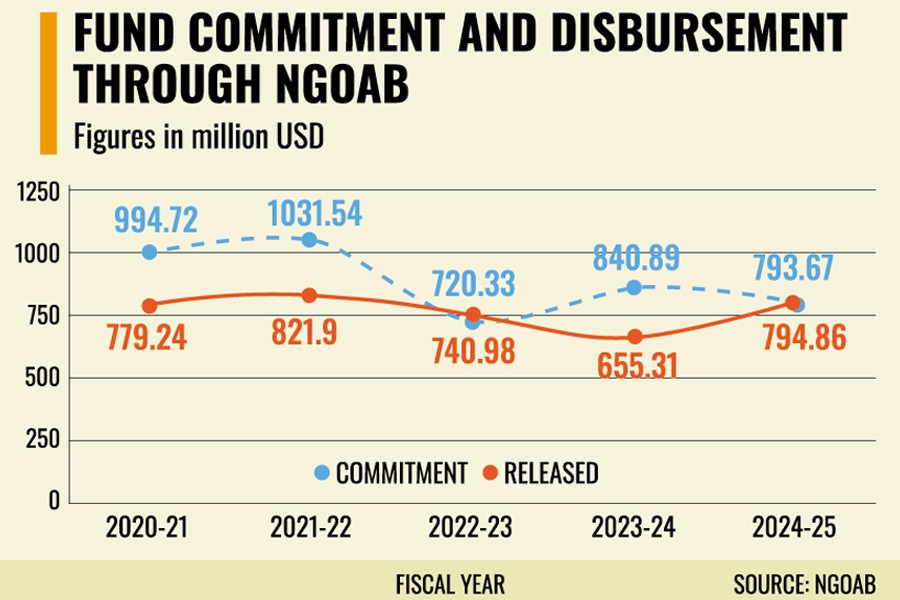
Published :
Updated :

Foreign donors have slightly scaled back their funding commitments for NGOs operating in Bangladesh, even as actual disbursements rose significantly in the last fiscal year amid growing humanitarian needs across the country.
According to the NGO Affairs Bureau (NGOAB), the total foreign aid pledged for FY2024-25 amounted to US$793.67 million, around 6.0 per cent lower than the previous year's $840.89 million.
Stakeholders attribute this decline in new commitments to a combination of factors, including Bangladesh's impending graduation from the Least Developed Country (LDC) group, shifting global donor priorities, and escalating international conflicts.![]()
Conversely, actual disbursements to NGOs rose markedly as development partners stepped up aid for flood victims and climate-affected regions. NGOs received $794.86 million during FY2024-25, nearly 21 per cent more than the $655.31 million disbursed in the previous fiscal year.
Insiders say many donors opted to increase contributions through local partners, recognising the country's urgent development needs in a changed global context.
However, a broader view reveals a downward trajectory in foreign fund flows since FY2018-19, when disbursements peaked at $955 million. Since then, aid flows have fluctuated, registering $945 million in FY2020, $779 million in FY2021, $822 million in FY2022, and $741 million in FY2023.
Despite the jump in disbursements last fiscal year, observers caution that the overall trend remains worrying. One particularly disruptive incident was the suspension of USAID support to Bangladesh, which reportedly resulted in the loss of development assistance worth US$700 million, causing considerable distress within the NGO sector.
Commenting on the issue, Farah Kabir, Country Director of ActionAid Bangladesh (AAB), identified several global and local reasons behind the declining donor commitments.
"The Russia-Ukraine war, the Israel-Hamas conflict, inflationary pressures, and economic downturns globally have all played a role," she noted.
"There's also a shift in donor priorities worldwide, coupled with Bangladesh's anticipated LDC graduation and both local and global political dynamics," she added.
Kabir further explained that 11 major bilateral donors have significantly reduced their aid budgets over the past two to three years. "Official Development Assistance (ODA) budgets have increasingly been diverted to defence or emergency humanitarian aid in conflict zones that align with trade and geopolitical interests."
She pointed out that FY2024-25 was a transitional period, with most bilateral donors formulating new country strategies, during which lower commitment levels were anticipated.
Referring to the challenges posed by LDC graduation, Kabir warned that a decline in NGO funding could hinder Bangladesh's smooth and sustainable transition. "NGOs have historically played-and continue to play-a crucial role in the country's development journey," she said.
She called for a unified approach, suggesting that the NGOAB, the Economic Relations Division (ERD), and the NGO community jointly assess the implications of the fund cutbacks and develop a cohesive strategy to maintain progress towards the Sustainable Development Goals (SDGs).
"We must also learn from other countries that have faced similar transitions," she added.
Despite the funding headwinds, project approvals rose notably during the reporting period. The NGO Affairs Bureau cleared 1,836 projects in FY2024-25, compared to 1,658 in FY2023-24.
As of May 2025, a total of 2,673 NGOs, including 281 foreign entities, were registered with the Bangladeshi government.
saif.febd@gmail.com


 For all latest news, follow The Financial Express Google News channel.
For all latest news, follow The Financial Express Google News channel.